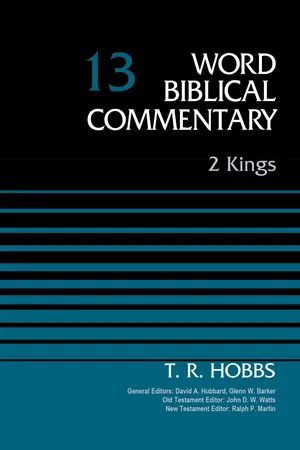
2 Kings, Volume 13
- 438 pages
- English
- ePUB (mobile friendly)
- Available on iOS & Android
About this book
Over 2 million copies sold in The Word Biblical Commentary series.
This commentary series delivers the best in biblical scholarship from the leading scholars of our day who share a commitment to Scripture as divine revelation.
It emphasizes a thorough analysis of textual, linguistic, structural, and theological evidence, resulting in judicious and balanced insight into the meanings of the text in the framework of biblical theology. These widely acclaimed commentaries serve as exceptional resources for the professional theologian and instructor, the seminary or university student, the working minister, and everyone concerned with building theological understanding from a solid base of biblical scholarship.
Overview of Commentary Organization:
- Introduction—covers issues pertaining to the whole book, including context, date, authorship, composition, interpretive issues, purpose, and theology.
- Pericope Bibliography—a helpful resource containing the most important works that pertain to each particular pericope.
- Translation—the author’s own translation of the biblical text, reflecting the end result of exegesis and attending to Hebrew and Greek idiomatic usage of words, phrases, and tenses, yet in reasonably good English.
- Notes—the author’s notes to the translation that address any textual variants, grammatical forms, syntactical constructions, basic meanings of words, and problems of translation.
- Form/Structure/Setting—a discussion of redaction, genre, sources, and tradition as they concern the origin of the pericope, its canonical form, and its relation to the biblical and extra-biblical contexts in order to illuminate the structure and character of the pericope. Rhetorical or compositional features important to understanding the passage are also introduced here.
- Comment—verse-by-verse interpretation of the text and dialogue with other interpreters, engaging with current opinion and scholarly research.
- Explanation—brings together all the results of the discussion in previous sections to expose the meaning and intention of the text at several levels: (1) within the context of the book itself; (2) its meaning in the OT or NT; (3) its place in the entire canon; (4) theological relevance to broader OT or NT issues.
- General Bibliography—occurring at the end of each volume, this extensive bibliography contains all sources used anywhere in the commentary.
Tools to learn more effectively

Saving Books

Keyword Search

Annotating Text

Listen to it instead
Information
Ahaziah and Elijah (1:1–18)
Bibliography

Translation
Notes




Table of contents
- Cover
- Title Page
- Copyright Page
- Dedication
- Contents
- Author’s Preface
- Editorial Preface
- Abbreviations
- Introduction
- Main Bibliography
- Ahaziah and Elijah (1:1–18)
- The Ascension of Elijah (2:1–25)
- Jehoshaphat and Joram against Moab (3:1–27)
- Elisha’s Works (4:1–44)
- Naaman’s Cure (5:1–27)
- Elisha and the Syrians (6:1–33)
- The Lepers and the Syrians (7:1–20)
- Hazael, King in Damascus (8:1–29)
- Jehu (9:1–37)
- The Reign of Jehu (10:1–36)
- The Revolt against Athaliah (11:1–20)
- The Reign of Joash (12:1–22 [11:21–12:21])
- Syrian Oppression and the Death of Elisha (13:1–25)
- Amaziah and Jeroboam II (14:1–29)
- Kings of the Eighth Century B.C. (15:1–38)
- The Apostasy of Ahaz (16:1–20)
- The Fall and Resettlement of Samaria (17:1–41)
- Hezekiah and the Siege of Jerusalem (18:1–37)
- Isaiah’s Prophecy and the Assyrian Retreat (19:1–37)
- Hezekiah and Isaiah (20:1–21)
- The Reigns of Manasseh and Amon (21:1–26)
- The Reign of Josiah (22:1–20)
- The Reign of Josiah, Continued (23:1–37)
- Attack and Deportation (24:1–20)
- Jerusalem Destroyed and Second Deportation (25:1–30)
- Indexes
Frequently asked questions
- Essential is ideal for learners and professionals who enjoy exploring a wide range of subjects. Access the Essential Library with 800,000+ trusted titles and best-sellers across business, personal growth, and the humanities. Includes unlimited reading time and Standard Read Aloud voice.
- Complete: Perfect for advanced learners and researchers needing full, unrestricted access. Unlock 1.4M+ books across hundreds of subjects, including academic and specialized titles. The Complete Plan also includes advanced features like Premium Read Aloud and Research Assistant.
Please note we cannot support devices running on iOS 13 and Android 7 or earlier. Learn more about using the app